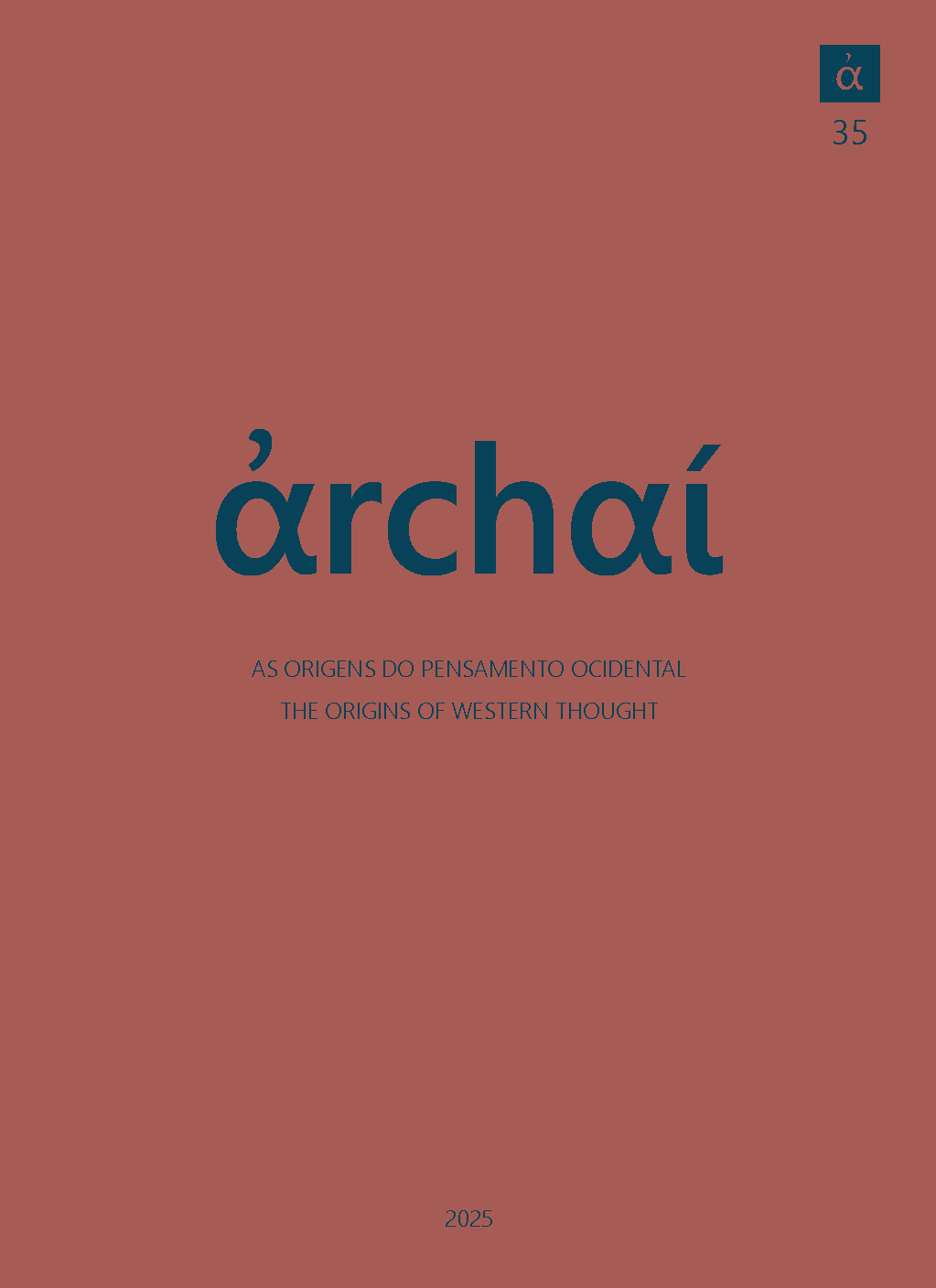Pherecydes of Syros: the one who didn't say everything in a mythical way
DOI:
https://doi.org/10.14195/1984-249X_35_14Keywords:
Pherecydes; cosmology; physikoi; astonishment; mythAbstract
Aristotle tells us in Metaphysics that Pherecydes did not speak everything in mythological language (1091b8), because, in his dialogue with the mythical tradition, he provides us with a cosmology that is not only marked by action gods. In his narrative about the origin of the cosmos, Pherecydes presents original divine powers generating from elements such as water, air and fire. One of these divine powers, Zás, working with love, and not as a warrior, embroidering a cloak and transforming himself into Eros to be able to acquire the generating power of everything that is. Therefore, Pherecydes reformulates both the narratives regarding divine events and those about the emergence of the cosmos, not depending exclusively on action gods. In this work I intend to explain how Ferécides’ thinking is inserted in the process of development of thought in the face of astonishment of what is.
Downloads
References
ALGRA, Keimpe (2008). Os princípios da cosmologia. In: LONG, A.A. Primórdios da Filosofia Grega. Trad. Paulo Ferreira. Aparecida, Ideias & Letras, p.91-114.
ALLEN, N. (2016). The common origin approach to comparing Indian and Greek philosophy. In: SEA-FORD, R. Universe and Inner Self in Early Indian and Early Greek Thought. Edinburgo, Edinburgh University Press, p.12-27.
BASTOS, Fernando. (2003). A teogonia de Ferécides de Siro. Lisboa, Imprensa Nacional, Casa da Moeda.
BRITO, Rodrigo Pinto de. (2014) Teogonia de Ferecides de Syros e o ambiente cultural do porto heleno-fenício de Syros: um exercício em teoria e metodologia de história. Prometeus, Ano 7, número 15, p 43-63.
BURKERT, W. (1999). The Logic of Cosmogony. In: BUXTON, R. (ed.). From Myth to Reason? Studies in the Development of Greek Thought. Oxford, Oxford University Press, p. 87-106.
COLLI, Giorgio. (2013) A sabedoria grega II. Trad. Renato Ambrosio. São Paulo, Paulus.
DIELS, H. (1897). Zur Pentemychos des Pherekydes. In: Sitzungsberichte der Königlich Preussischen Akademie der Wissenschaften zu Berlin I, Berlin, p. 144-156.
GHEERBRANT, Xavier. (2021). Phérécyde de Syros D6/R23 (LM) réexaminé. Philosophie antique 21, p.31-61.
GOMPERZ T. (1929) The Greek Thinkers. vol.1, Londres, John Murray.
GRANGER, H. (2007). The theologian Pherecydes of Syros and the Early Days of natural philosophy. Harvard Studies in Classical Philology, Vol.103, p 135-163.
JAEGER, W. (1992) La teología de los primeros filósofos griegos. México, Fondo de Cultura Económica.
KIRK, G.S.; RAVEN, J.E.; SCHOFIELD, M. (2010). Os filósofos pré-socráticos. Lisboa, Fundação Calouste Gulbenkian.
KURY, Mario da Gama. (2008). Diógenes Laertios. Vidas e doutrinas dos filósofos ilustres. (tradução). Brasília, Editora UnB.
LISI, Francisco. (1985). La teología de Ferécides de Siro. Helmantica: Revista de Filología Clásica y Hebrea 36, n. 110, p.251-276.
MANDOLFO, R. e ZELLER, R.(1932). La filosofia dei Greci nel suo sviluppo Storico, I. Florença, La Nuova Italia.
MOST, Glenn. (2008). A poética da filosofia grega em seus primórdios. In: Long, A.A. Primórdios da Filosofia Grega. Trad. Paulo Ferreira. Aparecida, Ideias & Letras, p.413-446.
NUNES, Carlos Alberto. (2004). Homero. Ilíada. (tradução). Rio de Janeiro, Ediouro.
REALE, Giovanni. (2002). Aristóteles. Metafísica (Texto e tradução do grego). Trad. Marcelo Perine. São Paulo, Edições Loyola.
REBOREDO, Luan. (2022). Le temps va-t-il disparaitre ? La doctrine d’Anaximandre sur la durée du monde et la durée des choses. Tese de doutorado. Sorbonne Université e Universidade Federal do Rio de Janeiro, França.
SANTAMARÍA, Marco Antonio. (2021). The Emergence of the World in Early Greek Theogonies from Hesiod to Acusilaus. In: BERNABÉ, Alberto e HERNÁNDEZ, Raquel Martín (Eds.) Narrating the Beginnings. Alemanha, Springer, p.117-138.
SANTAMARIA, Marco A. (2019). Pherecydes of Syros in the Papyrological Tradition In: Christian Vassallo (ed.), Presocratics and Papyrological Tradition: A Philosophical Reappraisal of the Sources. Proceedings of the International Workshop Held at the University of Trier. De Gruyter, p.91-107.
SASSI, Maria Michela.(2018). The beginnings of philosophy in Greece. Princeton, Princeton Univerty Press.
SIBLI, H. (1990). Pherekydes of Syros. Oxford, Clarendon Press.
TORRANO, Jaa. (2007). Hesíodo. Teogonia (Tradução e estudos). São Paulo, Iluminuras.
VÁZQUEZ, Roque Lazcano. (2020). Ferecides de Siro y las cosmologías quinarias de la antigüedad. Materiales para una discusión. R. Ἰlu - Revista de Ciencias de las Religiones 25, p 77-104.
WALCOT, P. (1965). Five or seven recesses? The Classical Quarterly, vol.15, n.1, p.79.
WEST, M.L. (1963 ). Three Presocratic Cosmology. The Classical Quarterly, vol.13, n.2, p.154-176.
Downloads
Published
How to Cite
Issue
Section
License
Copyright (c) 2025 Cristiane Almeida de Azevedo

This work is licensed under a Creative Commons Attribution 4.0 International License.
Given the public access policy of the journal, the use of the published texts is free, with the obligation of recognizing the original authorship and the first publication in this journal. The authors of the published contributions are entirely and exclusively responsible for their contents.
1. The authors authorize the publication of the article in this journal.
2. The authors guarantee that the contribution is original, and take full responsibility for its content in case of impugnation by third parties.
3. The authors guarantee that the contribution is not under evaluation in another journal.
4. The authors keep the copyright and convey to the journal the right of first publication, the work being licensed under a Creative Commons Attribution License-BY.
5. The authors are allowed and stimulated to publicize and distribute their work on-line after the publication in the journal.
6. The authors of the approved works authorize the journal to distribute their content, after publication, for reproduction in content indexes, virtual libraries and similars.
7. The editors reserve the right to make adjustments to the text and to adequate the article to the editorial rules of the journal.














